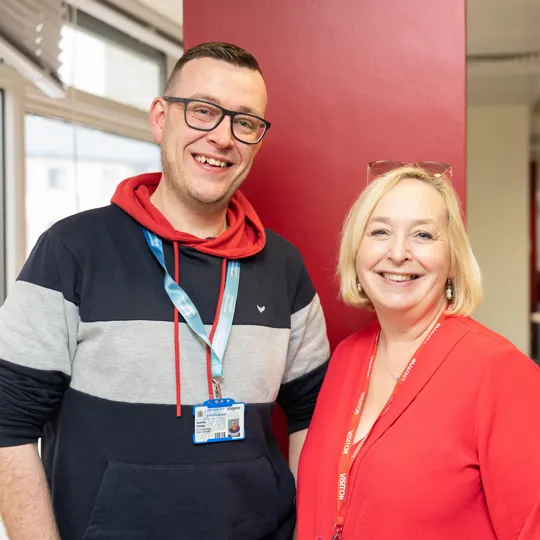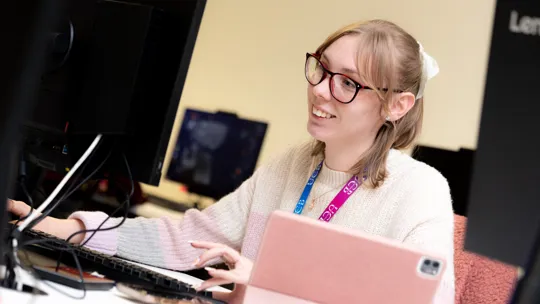January 2023
Accelerated apprenticeship launched to turn nursing associates into full practitioners
By Melanie Hall
Share post:Read time: approx 6 mins
A brand new accelerated degree apprenticeship designed to train nursing associates working everywhere from emergency wards to prisons into full clinical practitioners has been launched to alleviate the pressure on healthcare teams across the region and UK.
The first cohort on the University’s Registered Nurse Degree Apprenticeship began their training this week to take the step up and qualify to carry out all complex nursing tasks, lead on assessment, plan, provide and evaluate care and coordinate and manage patient care.
The 42 apprentices – 29 in the field of adult nursing and 13 in mental health – work for Cygnet Healthcare, University Hospitals Birmingham (UHB) NHS Foundation Trust and Practice Plus Group (Health in Justice), who all worked in collaboration with the University to develop the programme, with input from service users and current nursing students and apprentices.
Crucially, the course enables students to qualify in 18 months, compared with the three years it would take to complete a Registered Nurse degree from scratch.
Deputy Dean Marina Kendrick RN said: “Upskilling Registered Nursing Associates into full Registered Nurses is imperative to meet spiralling regional demand.
"There are around 48,000 nursing vacancies waiting to be filled nationwide, with 19% of these in the West Midlands.
“Registered Nursing Associates bridge the gap between healthcare support workers and Registered Nurses to reduce waiting times, delivering hands-on, person-centred care as part of a multidisciplinary team."
Course leader and senior lecturer Phil Cracknell, who is an advanced clinical practitioner, said the programme will enable the apprentice to be able to carry out the full range of complex nursing tasks.
"These include managing effective patient care and broadening their clinical proficiencies and leadership skills to be registered with the Nursing and Midwifery Council (NMC)," he said.
"Mental health is also an important field of nursing and we need to ensure we can build a badly-needed workforce of qualified nurses in this area.”

Reducing pressure on clinical teams
Apprentice Sasha Moate is a nursing associate for Practice Plus Group at HMP Bure in Norwich, providing everything from health checks and cancer screenings to emergency response for prisoners who might have attempted suicide or need resuscitation.
She said the shortfall in nurses in the UK was a real concern.
“The prisoners we work with are mainly over 50 or elderly, but in the last few years, we have seen more and more younger prisoners on remand coming to us with crises and mental health issues,” she said.
“Being fully qualified as a Registered Nurse will benefit me and my team as I can go out and assess people and make care plans and clinical decisions. It will take the pressure off my team as well as helping to give me more scope and reach where I want to be.”
She added that she had been warmly welcomed at her first session at University College Birmingham.
“Everyone was so approachable and I felt really valued,” said Sasha, who is following in the footsteps of her mum, a former healthcare worker.
“As we are spread out around the country, we have some online sessions and were even given an iPad to make things as easy as possible for us.”
Apprentice Amy Rogers, who trains nursing associate students for UHB, started out in orthopaedics and has been in the healthcare sector for 19 years.
“I train up the next generation while working in a clinical setting, which is the best of both worlds,” she said. “There’s no greater feeling than knowing you have helped someone with their recovery, and becoming a Registered Nurse will enable me to build on my skills further.
“The nursing training suite at University College Birmingham is impressive and the team really values the importance of apprenticeships.”
"There are around 48,000 nursing vacancies waiting to be filled nationwide, with 19% of these in the West Midlands. Registered Nursing Associates bridge the gap between healthcare support workers and Registered Nurses to reduce waiting times, delivering hands-on, person-centred care as part of a multidisciplinary team."

Apprentices and employers working together
Focus on STEM
The new Registered Nurse Degree Apprenticeship builds on a growing range of STEM-focused degree apprenticeships provided by University College Birmingham.
They include our own Nursing Associate degree apprenticeship, the equivalent of a two-year foundation degree, which was launched last year.
These apprenticeships are built around a diverse circuit of placements in everything from mental health support for adolescents to working with prisoners.
Key to this is our growing partnerships and exceptional engagement with regional employers, working together to strengthen the local economy.
Cutting-edge technology
University College Birmingham has invested in a raft of cutting-edge technology to support students on its healthcare and nursing degrees and degree apprenticeships.
These include a 360° immersive video room to give students access to 200 interactive health and social care backgrounds, while virtual reality software, simulation manikins and mental health-focused online case studies and scenarios are designed to help them grow in confidence.
Winning University of the Year and Best Student Support at the 2022 Whatuni Student Choice Awards – the only UK awards voted for by students – we have invested £160 million in our facilities in the last 10 years to support our higher – and further – education provision.
To find out more about working in partnership with University College Birmingham to upskill employees through apprenticeships, contact Marina Kendrick, Deputy Dean of Apprenticeships, at m.kendrick@ucb.ac.uk
Find out more about range of industry-led college and degree-level courses within our Department of Health.






